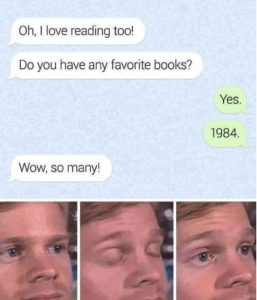Rationale
Welcome to the first full unit of the course. This unit is based on the importance of Reading.

In this chapter we are looking at the processes of reading. It’s probably not something you have done much of since about year 4. Reading is taught to the point where you can pick up the words on the page and read at about the speed that you speak.
However, if you can move past this stage and learn to read quicker, more accurately and more thoroughly, then English will become easier. It also happens to help you with other subjects too.
We begin this unit with looking at the concept of Reading for Pleasure before looking at Reading for Meaning and, finally Reading for Study.
All three disciplines have slightly different requirements when it comes to reading. This is a vital unit of work and has been prioritised to make sure you can understand this prior to moving onto to more literature skill.
Learning Objectives
The Learning Objectives for the Reading Workshop are:
Reading for Pleasure
- Identify your own reading preferences
- Articulate your own reading ability
- Introduce the styles of reading:
- for Pleasure
- for Meaning
- for Study
- Recognise different strategies for approaching texts – particularly Reading for Pleasure.
- Discuss reading skills with the teacher and/or a partner.
- Explain the purpose of the blurb as the introduction to summary writing and persuasive writing.
Reading for Meaning
- Identify annotation.
- Use annotation skills independently.
- Articulate the difference between skimming and scanning.
- Recognise some elements outside the given text (inferencing)
- Explain the process of summary.
- Identify key points within a given text.
- Summarise independently.
Reading for Study
- Explain how reading can affect study techniques.
- Identify key elements in their own writing for consolidation.
- Highlight key points from a given text.
- Organise work into logical ‘chunks’

Key Terms
Reading for Pleasure
|
choosing reading material for independent consumption and enjoyment. |
|
the ability to read and write. |
|
something that is invented, or untrue. |
|
something that is based on fact or evidence. |
|
a spoken or written account of events; a story. |
|
a fictitious prose narrative of book length, typically representing character and action with some degree of realism. |
|
a piece of writing in which the expression of feelings and ideas is given intensity by particular attention to diction (sometimes involving rhyme), rhythm, and imagery. |
|
providing useful or interesting information. |
|
a style or category of art, music, or literature. |
Reading For Meaning
|
implied or explicit significance. |
|
the ability to understand something. |
|
a note by way of explanation or comment added to a text or diagram. |
|
look quickly but not very thoroughly through (a document or other text) in order to identify relevant information. |
|
the action of reading something quickly so as to note only the important points. |
|
a brief statement or account of the main points of something. |
|
a conclusion reached on the basis of evidence and reasoning. |
|
a short description of a book, film, or other product written for promotional purposes.
|
|
the reason for which something is done or created or for which something exists.
|
Reading for Study
|
the action or process of combining a number of things into a single more effective or coherent whole. |
|
the devotion of time and attention to gaining knowledge of an academic subject, especially by means of books. |
|
relating to education and scholarship. |
|
a statement or account that makes something clear. |
|
intended to explain or describe something. |
|
a spoken or written account of a person, object, or event. |
Ko te reo te tuakiri | Language is my identity.
Ko te reo tōku ahurei | Language is my uniqueness.
Ko te reo te ora. | Language is life.